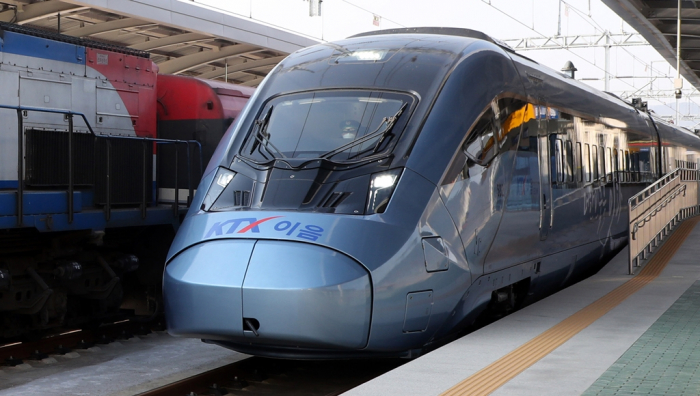Machinery
Japan, Spain firms join forces with Woojin for Korean bullet train bid
Talgo, Toshiba team up with local railway maker to win $533 mn deal to supply high-speed trains with distributed power system
By Oct 10, 2022 (Gmt+09:00)
4
Min read
Most Read
LG Chem to sell water filter business to Glenwood PE for $692 million


Kyobo Life poised to buy Japan’s SBI Group-owned savings bank


KT&G eyes overseas M&A after rejecting activist fund's offer


StockX in merger talks with Naver’s online reseller Kream


Mirae Asset to be named Korea Post’s core real estate fund operator



A Japanese company and a Spanish firm have joined hands with a South Korean company for a local bullet train supply deal as the country is expected to replace more of its high-speed trains with new models.
The state-run Korea Railroad (Korail) plans to announce a bid to buy 136 units of the EMU-320, a high-speed train with a distributed power system, for 760 billion won ($533.3 million) as early as around end-October, according to the railway industry on Monday.
The contract will mark Korail’s first purchase of the high-end next-generation train. Korail has been buying high-speed trains with power cars so far.
Spain’s high-speed passenger trains manufacturer Talgo and Japan’s Toshiba Corp. formed a consortium with a South Korean railway vehicle maker Woojin Industrial Systems Co. for the project. The three companies in June already agreed on technology cooperation.
Woojin, which has yet to manufacture high-speed trains, is eyeing the deal based on the foreign partners' key technologies on body and propulsion systems.
“Spain's Talgo will supervise the design and production of vehicle bodies and railroad bogies while we will cooperate on the vehicle propulsion system technology with Japan's Toshiba in an aim to manufacture high-speed trains,” Woojin said in a report to Korail.
PRICE COMPETITIVENESS
Talgo and Toshiba joined forces with Woojin as Korail’s latest project is the beginning of such deals in South Korea. Most of the country’s bullet trains – the Korea Train eXpress (KTX) and the Super Rapid Train (SRT) – are currently high-speed trains with power cars, which have low profitability and cost more for maintenance and repairs. Those trains will be replaced with distributed power system models.
South Korea’s Hyundai Rotem Co., a railway system maker under Hyundai Motor Group, has been developing a distributed power system along with parts makers since 2007. It rolled out the KTX-Eum, its first train with the system in January 2021. Last month, it unveiled the country’s fastest bullet train that can run at a maximum speed of 320 kilometers (199 miles) an hour.
Talgo, which has not manufactured a high-speed train with a distributed power system, needs a track record on such a model to win similar contracts in other countries, given the worldwide trend to use bullet trains with the technology.
The South Korean railway industry, which has better technology than Talgo, is concerned over the Spanish company’s price competitiveness.
Korail selects the lowest bidders for high-speed train purchases. It evaluates technically qualified bidders only with prices, industry sources said. That added to worries that local companies may lose out in the competition for the deal.
Talgo’s consortium tried to alleviate the concerns, pledging to use parts produced in South Korea.
“We will first use parts produced at home and abroad which have been supplied before,” the consortium said in the report. “We plan to localize the design and production technology to improve maintenance efficiency.”
The vow failed to soothe the domestic railway industry as the sector said Talgo’s parts are not compatible with local products.
NATIONAL INFRASTRUCTURE
The South Korean railway industry has complained that the authorities do not take as strong measures to protect the local sector as other countries.
The European Union, for example, effectively prevents non-European companies from working for the bloc’s railway industry through a technical specification for interoperability (TSI), a regulation for railway compatibility that requires specifications of vehicle designs, parts and others.
Spain, the home to Talgo, also qualitatively evaluates foreign companies that plan to participate in local railway projects. The country does not unveil the evaluation criteria for regulating makers from other countries.
“Countries are protecting their local industries at a time when global competition in the high-speed train sector is intensifying,” said a South Korean railway industry source. “On the other hand, South Korea is the only country with no restrictions on bidding.”
But Woojin said South Korea needs more competition.
“The domestic high-speed railway sector is virtually monopolized, losing chances for sustained development,” the company said. “It is necessary to induce companies to cut costs through competition.”
Write to Han-Shin Park at phs@hankyung.com
Jongwoo Cheon edited this article.
More to Read
Comment 0
LOG IN



